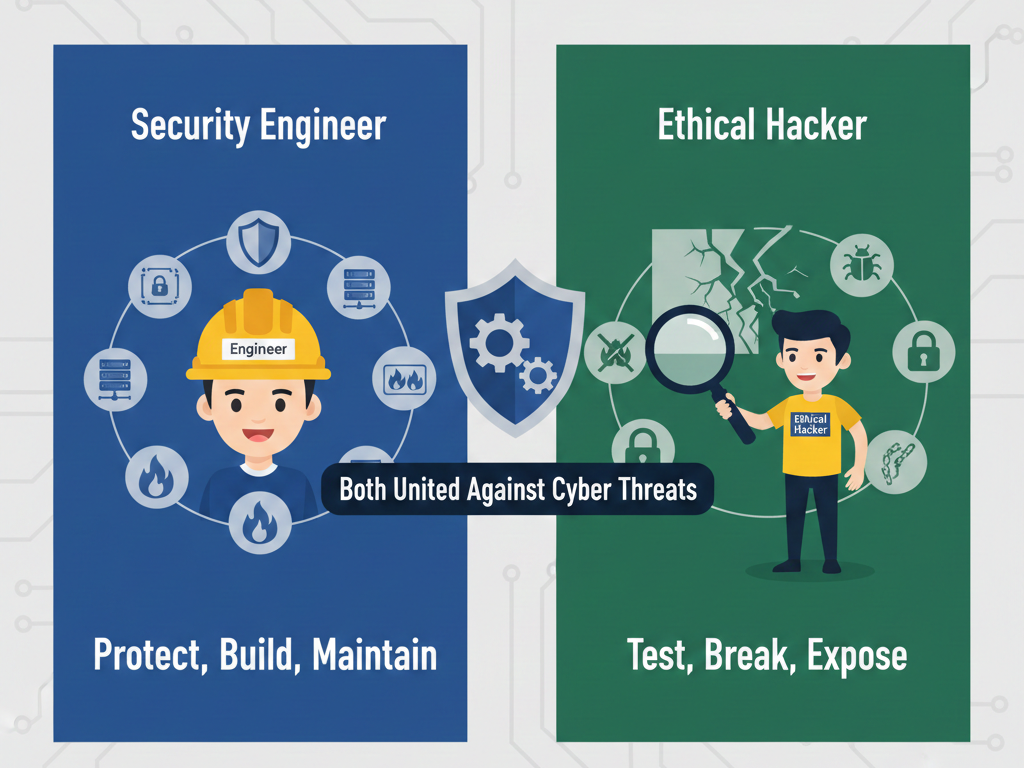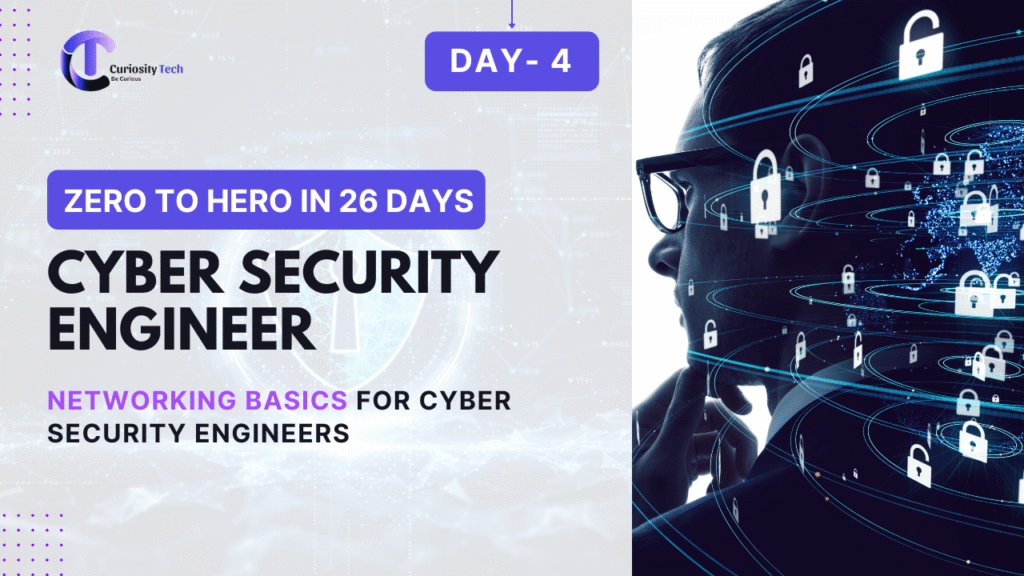When students at CuriosityTech (Nagpur) walk into our workshops, one of the most common questions they ask is:
“Should I become a Cyber Security Engineer or an Ethical Hacker?”
The confusion is natural. Both roles deal with fighting cyber threats. Both roles carry prestige in the IT ecosystem. Yet, in practice, they play very different parts in protecting organizations. Over my 20 years of experience, I’ve worked both sides of the fence—designing security architectures as an engineer and performing penetration testing in the role of an ethical hacker. What I have learned is simple:
- A Cyber Security Engineer is like an architect and builder, designing robust systems to prevent attacks.
- An Ethical Hacker is like a burglar hired by the house owner, testing every lock, window, and entry point for weaknesses.
To understand this better, let’s dive deep into the differences in skills, responsibilities, and career paths.
Definition & Roles
| Aspect | Cyber Security Engineer | Ethical Hacker |
| Definition | A professional responsible for designing, building, and managing secure networks, systems, and applications. | A professional who proactively tests systems by simulating real-world cyberattacks to discover vulnerabilities before attackers exploit them. |
| Goal | Build defense systems to prevent threats. | Find weaknesses by attempting to break into systems (legally). |
| Approach | Defensive & preventive. | Offensive & investigative. |
| Work Environment | Corporate IT, continuous monitoring, compliance-driven. | Project-based penetration tests, red teaming, audits. |
Think of the Engineer as the shield, and the Ethical Hacker as the spear—both crucial, but serving different strategies.
Skills Comparison
| Skills Required | Cyber Security Engineer | Ethical Hacker |
| Networking Knowledge | Deep knowledge, firewall config, IDS/IPS, VPNs | Strong grasp to exploit misconfigurations |
| Operating Systems | Linux & Windows hardening | Exploiting OS flaws, privilege escalation |
| Programming | Python, Java, Bash for automation & secure coding | Python, Ruby, C for exploit development |
| Tools | SIEM, Firewalls, Cloud Security platforms (AWS GuardDuty, Splunk) | Kali Linux, Nmap, Burp Suite, Metasploit, Wireshark |
| Certifications | CISSP, CompTIA Security+, CCSP | CEH, OSCP, GPEN |
| Mindset | “How to protect?” | “How to break?” |
Daily Life of Each Role
Cyber Security Engineer’s Daily Life:
- Morning: Review phishing incident reports, update firewall rules.
- Afternoon: Deploy a patch for a discovered vulnerability in production.
- Evening: Analyze SIEM logs for unusual activities, document compliance checks.
Ethical Hacker’s Daily Life:
- Morning: Run an Nmap scan on a target company’s network.
- Afternoon: Attempt SQL injection on a test application.
- Evening: Deliver a penetration test report listing critical vulnerabilities and exploitation steps.
I often explain to learners that at Curiosity Tech Nagpur when companies hire us for consultations, they lean on both individuals. While engineers create always-on security models, ethical hackers are often brought in as specialized consultants for periodic stress testing.
Infographic Description
Picture a horizontal split infographic:

- On the left, a figure wearing a hard hat labeled Engineer, surrounded by shields, padlocks, and firewall designs. Below: “Protect, Build, Maintain.”
- On the right, a figure holding a magnifying glass labeled Ethical Hacker, pointing at cracks in a digital wall. Below: “Test, Break, Expose.”
- At the center: “Both United Against Cyber Threats.”
This visual would immediately show students that one role builds security while the other breaks security to improve it.
Career Path Outlook in 2025
Cyber Security Engineer
- Growing rapidly due to cloud adoption and compliance enforcement.
- Average salary in India: ₹10–18 LPA.
- Career ladder: Junior Security Analyst → Security Engineer → Security Architect → Chief Information Security Officer (CISO).
Ethical Hacker
- Increasing demand from penetration testing firms, defense organizations, and bug bounty programs.
- Great flexibility—can work as freelancer, consultant, or in red teams.
- Average salary in India: ₹8–15 LPA, but skilled hackers in global markets often cross ₹30+ LPA.
Real-World Case
In 2024, a mid-sized fintech client approached our team at Curiosity Tech. Their Engineers had implemented firewalls, MFA, and cloud monitoring. Everything seemed secure. But when our Ethical Hackers simulated a phishing attack, nearly 25% of employees clicked a malicious link.
Lesson Learned:
- Engineers built strong technology defenses.
- Hackers exposed the human vulnerability.
This story reinforces why both roles complement each other. Neither one can succeed alone.
Expert Note From 20 Years in the Field
If you want to choose a role:
- Pick Cyber Security Engineer if you enjoy system design, continuous protection, stability, and compliance.
- Pick Ethical Hacking if you love puzzles, discovering hidden cracks, and outsmarting attackers.
But keep this in mind: every excellent engineer must learn some hacking, and every great hacker must understand engineering principles. At CuriosityTechPark (Instagram/LinkedIn/Facebook), we encourage our students to gain cross-disciplinary skills before specializing.
Conclusion
In the cyber security battlefield of 2025, engineers and ethical hackers are two sides of the same coin. One prevents, the other challenges. A digital defense without engineers crumbles; a digital wall without hackers remains untested. To build a professional career, you must first understand these differences deeply—and then decide which mindset resonates with your passion.
At CuriosityTech.in (Phone: +91-9860555369 | Email: contact@curiositytech.in), we believe choosing between Cyber Security Engineering and Ethical Hacking isn’t just about a job—it’s about your personality, curiosity, and your vision to contribute to a safer cyber world.



